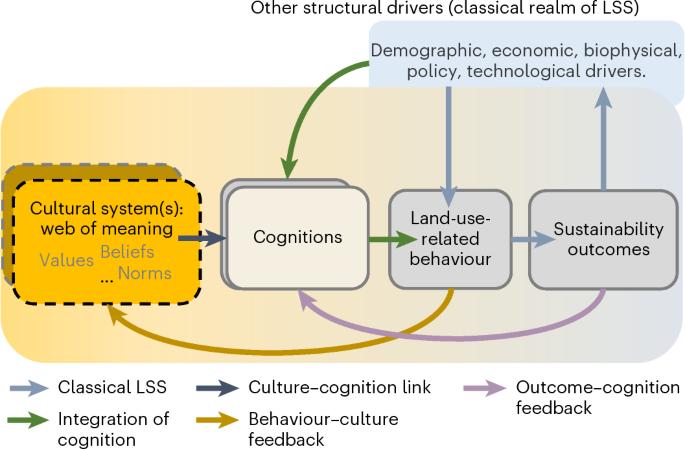Characterizing culture’s influence in land systems
IF 25.7
1区 环境科学与生态学
Q1 ENVIRONMENTAL SCIENCES
引用次数: 0
Abstract
Group-shared attributes, coded in cultural systems, heavily influence how land is used. Despite recent advances in behavioural theory, the central role of culture in land-use decision-making and linked sustainability outcomes is underexplored. We expanded on institutional analysis and system-dynamics frameworks to analyse 66 studies that causally link culture to land use. We found that most studies focus on norms, practices, values or meanings. These can lead actors to maintain a particular land use, which is coded into cultural systems, adding to the land system’s resilience. Internal group events or changes in structural factors can also lead to shifting norms and values, changing land use or destabilizing systems, leading to new system dynamics or resistance to new feedbacks. Our findings further link cultural underpinnings of land systems to positive and negative sustainability outcomes. We call for further research on the role of culture in land-system dynamics. While land use is often seen as a function of governance and economics, the role of culture is largely understudied. This study examines the cultural dynamics that play a role in a wide range of land-use outcomes globally

描述文化对土地系统的影响
在文化系统中编码的群体共享属性在很大程度上影响着土地的使用方式。尽管最近行为理论取得了进展,但文化在土地利用决策和相关可持续发展结果中的核心作用却未得到充分探索。我们以制度分析和系统动力学框架为基础,分析了 66 项将文化与土地利用存在因果关系的研究。我们发现,大多数研究侧重于规范、实践、价值观或意义。这些因素可引导行为者保持特定的土地利用方式,并将其编码到文化系统中,从而增强土地系统的复原力。内部群体事件或结构性因素的变化也会导致规范和价值观的转变,改变土地用途或破坏系统稳定,从而产生新的系统动态或抵制新的反馈。我们的研究结果进一步将土地系统的文化基础与积极和消极的可持续性结果联系起来。我们呼吁进一步研究文化在土地系统动态中的作用。土地利用通常被视为治理和经济的功能,而文化的作用在很大程度上却未得到充分研究。本研究探讨了在全球范围内各种土地利用结果中发挥作用的文化动力。
本文章由计算机程序翻译,如有差异,请以英文原文为准。
求助全文
约1分钟内获得全文
求助全文
来源期刊

Nature Sustainability
Energy-Renewable Energy, Sustainability and the Environment
CiteScore
41.90
自引率
1.10%
发文量
159
期刊介绍:
Nature Sustainability aims to facilitate cross-disciplinary dialogues and bring together research fields that contribute to understanding how we organize our lives in a finite world and the impacts of our actions.
Nature Sustainability will not only publish fundamental research but also significant investigations into policies and solutions for ensuring human well-being now and in the future.Its ultimate goal is to address the greatest challenges of our time.
 求助内容:
求助内容: 应助结果提醒方式:
应助结果提醒方式:


